- Academics+
- Colleges & Institutes
- Undergraduate
- Graduate
- International Education
- FACULTY LISTINGS/SUPERVISORS INFORMATION
- College of Architecture and Civil Engineering
- College of Architecture and Urban Planning (CAUP)
- College of Art and Design
- College of Chemistry and Life Science
- College of Computer Science
- College of Economics and Management
- College of Environmental Science and Engineering
- College of Foreign Languages
- College of Marxism
- College of Materials Science and Engineering
- College of Mechanical and Energy Engineering
- College of Metropolitan Transportation
- School of Information Science and Technology
- School of Mathematics Statistics and Mechanics
- School of Physics and Optoelectronic Engineering
- School of Sociology
- Admission+
- Research+
- Global+
- Life @ BJUT+
- About+
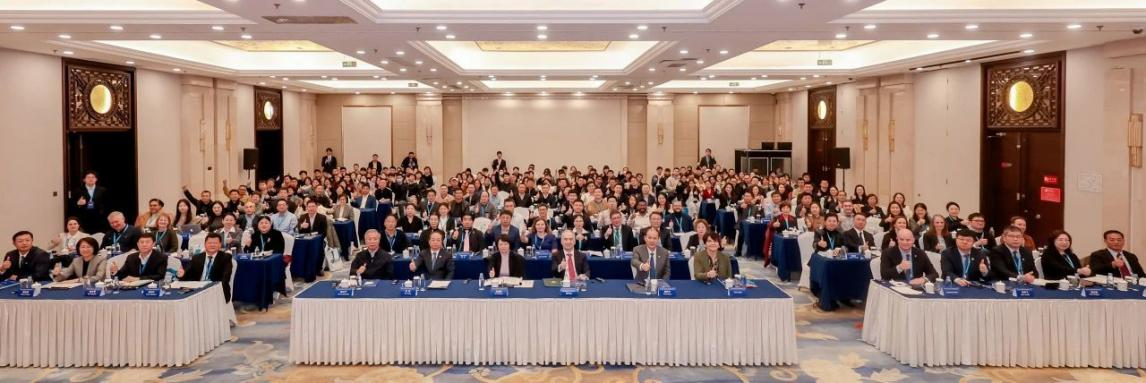
This year marks the 45th anniversary of the establishment of diplomatic relations between China and Ireland. The Sino-Irish Joint Symposium on Technological Innovation, Higher Education and Policy Impact for Sustainability, jointly organized by Beijing University of Technology (BJUT) and University College Dublin, (UCD), opened on December 10 at BJUT. The symposium aims to establish an international cooperation platform centered on sustainable development, addressing global climate change and jointly exploring pathways to foster new quality productive forcesthrough education, technological innovation, government policies, climate action, and carbon reduction. It also seeks to strengthen China-Ireland collaboration in education, science, and technological innovation, using the contributions higher education establishments can make towards sustainable development. About 300 participants, including representatives from government departments, domestic and international universities, and educational and media institutions, attended the opening ceremony and actively participated in forum discussions, group seminars, andindustry-academia-research cooperationover the subsequent two days.
Nicholas O'Brien, Ambassador of Ireland to China; Xu Jianshu,Level II Bureau Rank Official; Zhao Qinping, Academician of the Chinese Academy of Engineering (Former Vice Minister of Education); Orla Feely, President of UCD; Tatsman Crowe, Vice Presidentfor Sustainability of UCD; He Ming, Secretary of CPC BJUT Committee; Nie Zuoren, President of BJUT, and a member of the Chinese Academy of Engineering; Chen Qizhen, Vice Director of the Administrative Center for China's Agenda 21; and Zhang Xiliang, Director of the Institute of Energy, Environment and Economy at Tsinghua University, along with other leaders and experts, attended the opening ceremony.
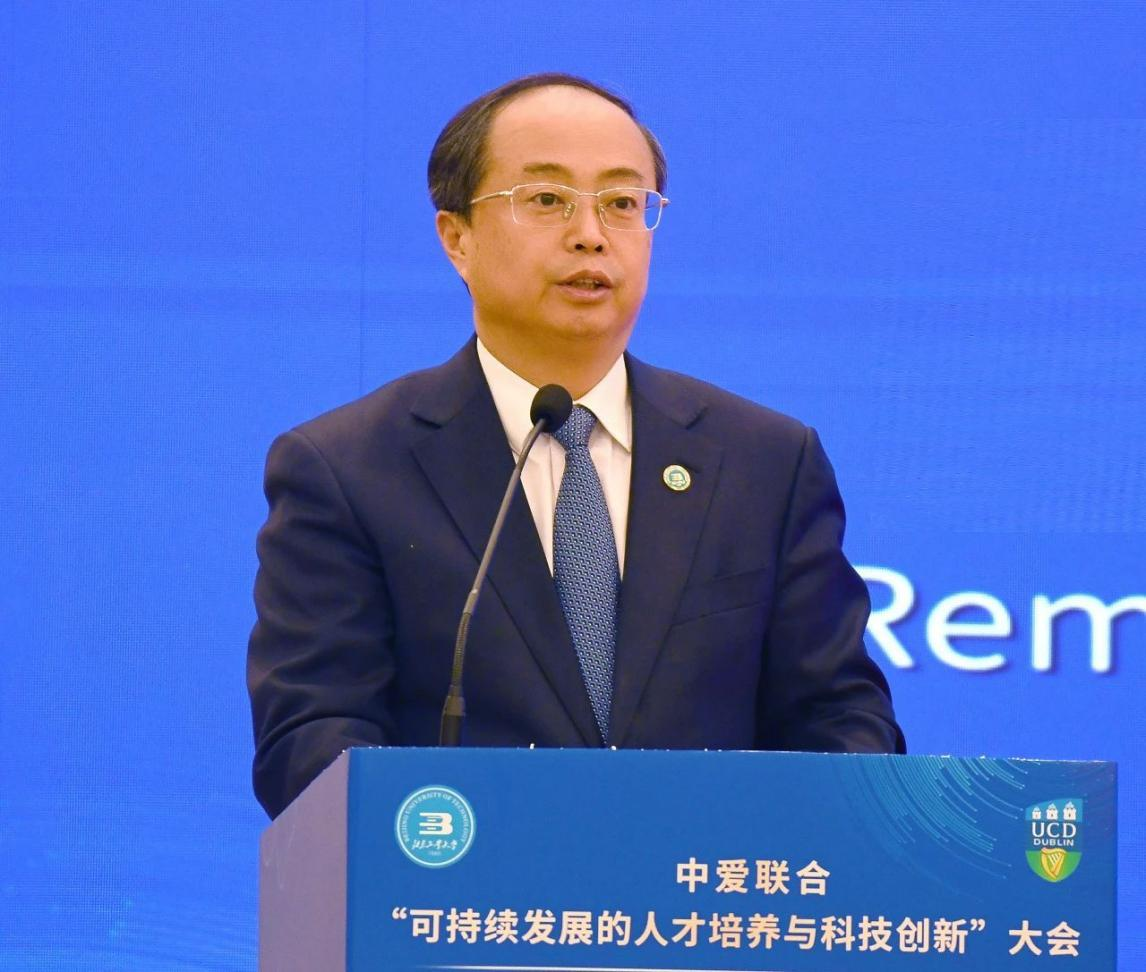
As the host of the opening ceremony, He Ming emphasized the strong foundation of cooperation between BJUT and UCD. He noted that the Beijing-Dublin International College has become a model for higher education exchange between the two countries and a symbol of the friendly relations between China and Ireland. He highlighted that sustainable development is a shared vision for global society. By focusing on "Technological Innovation, Higher Education, and Policy Impact for Sustainability," the two universities are working together to establish a new paradigm for international cooperation incultivatingtechnological talent, offering valuable practices to address major challenges and contribute to building a community with a shared future for mankind. BJUT will continue to uphold "thetoppriorities of the Country," focus on China's national needs, and aim for world-class standards. It will maintain and improve the already excellent momentum in China-Ireland educational exchanges and cooperation, expand the scale of this collaboration, and inject new vitality into the development of China-Ireland bilateral relations.
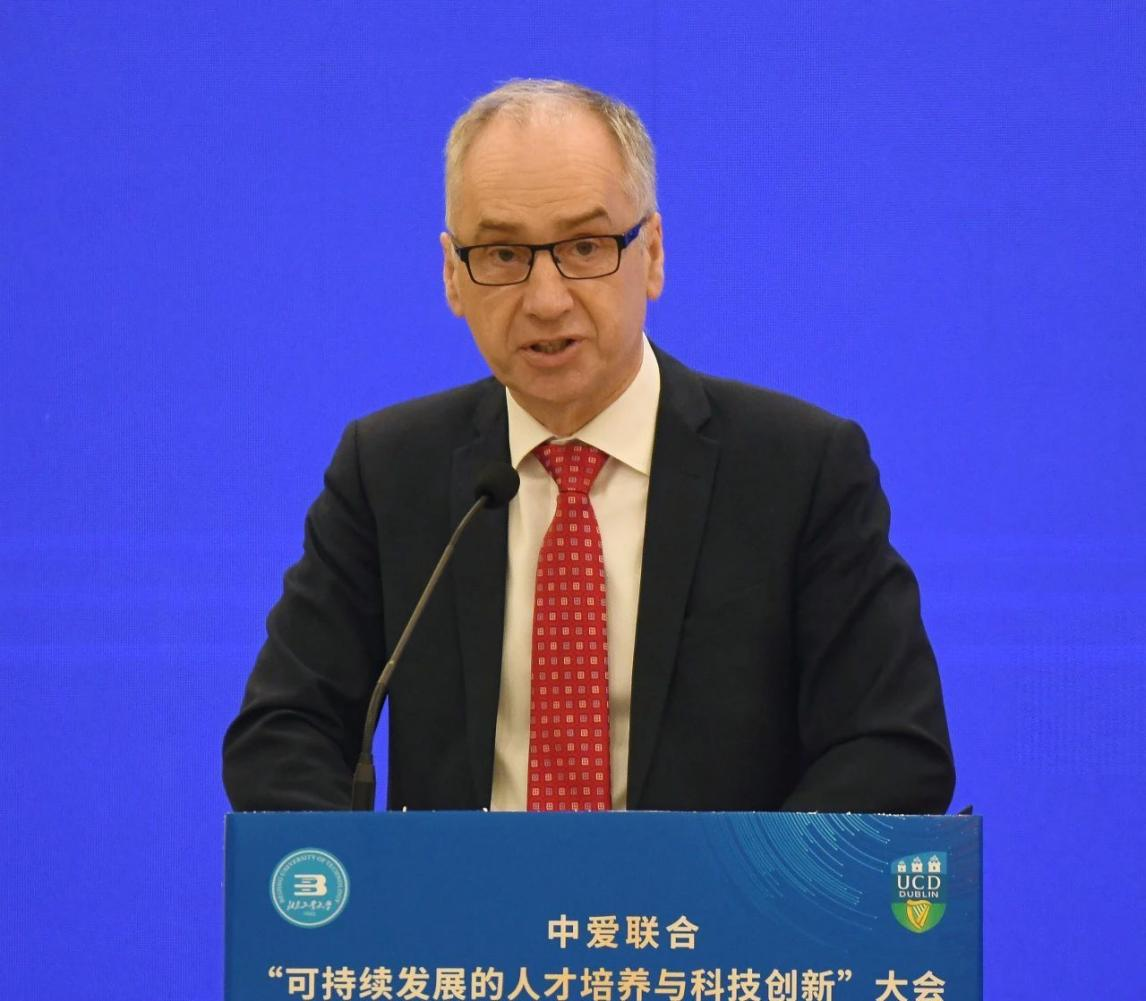
In his speech, Nicholas O'Brien highlighted that educational cooperation is a vital component of the China-Ireland bilateral relationship, particularly in fostering people-to-people exchanges. The Beijing-Dublin International College is the first and largest college jointly run by the two countries. He sincerely thanked the College leadership and all its staff for their dedication. He also noted that the symposium's roundtable discussions on the opportunities and challenges of Sino-foreign cooperative education is a valuable continuation of the second Sino-Irish Alliance of Joint Education (Chinese Universities) Conference. Ireland recognizes the global impact of climate change and is responsible for addressing these challenges. It is also making progress toward its set goals. He expressed hope that both countries will work together to achieve the 2030 targets and help other nations realize sustainable development.
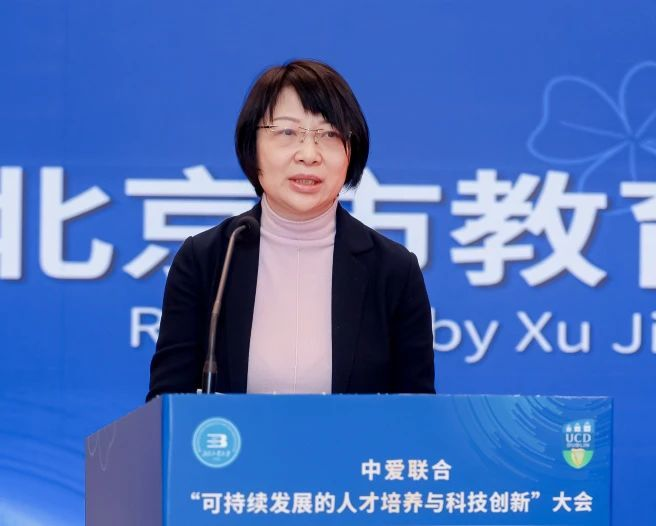
Xu Jianshu stated that this year marks the 45th anniversary of the establishment of diplomatic relations between China and Ireland, as well as the 13th anniversary of Beijing and Dublin becoming twinned sister cities. The two sides have engaged in productive cooperation in the field of education, and the Beijing-Dublin International College has become a successful model for Sino-foreign cooperative education. She also stated that thesymposium exemplifies the active efforts of universities of both countries in addressing global challenges and exploring pathways to sustainable development. She hoped that both sides will continue to deepen cooperation in talent development and technological innovation, create new highlights, achieve new breakthroughs, and take their collaboration to new heights.
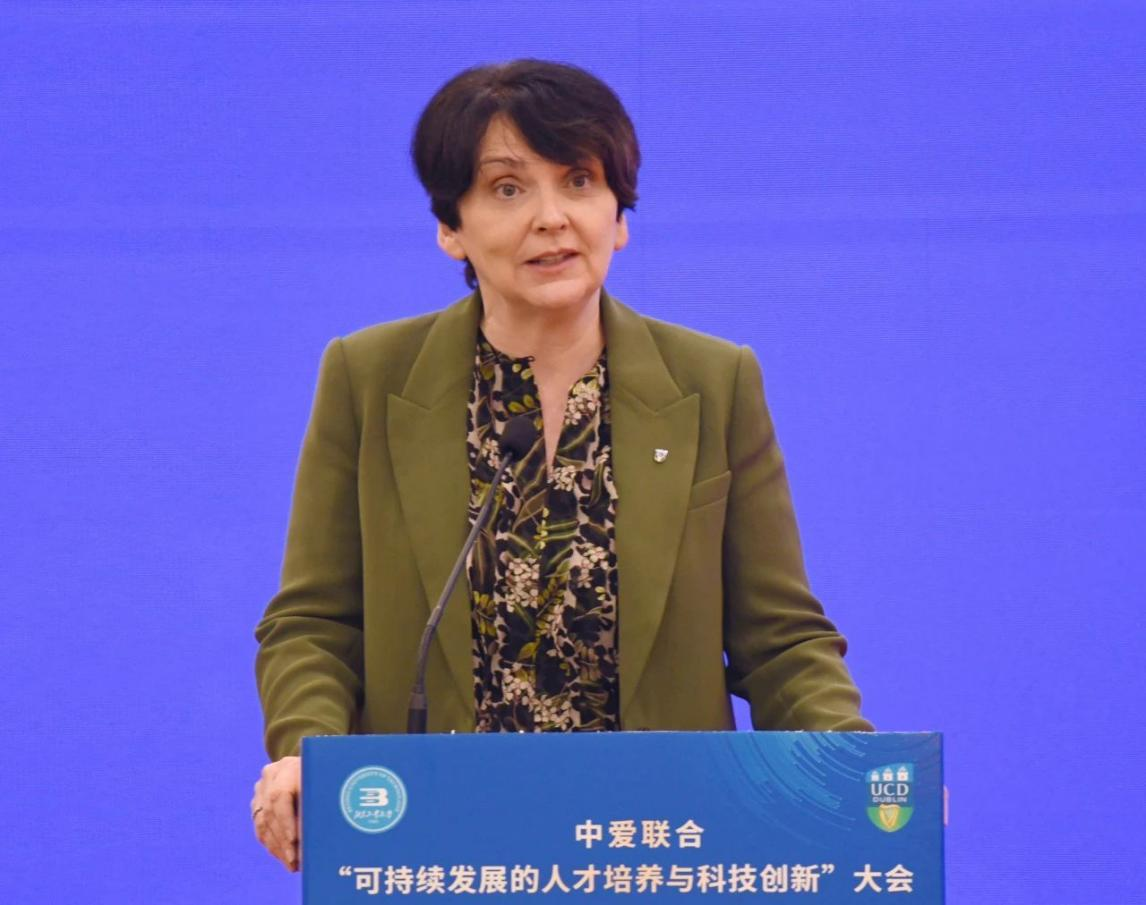
Orla Feely stated that UCD and BJUT have a long history of cooperation, and that the Beijing-Dublin International College, jointly founded by the two institutions, has cultivatednumerousoutstanding talents, exemplifying the continuous development of China-Ireland educational cooperation. Currently, the scale of educational cooperation between the two countries has reached tens of thousands of involved people, reflecting the achievements of their collaboration and realizing their shared goals. UCD places great importance on sustainable development, fully acknowledges the responsibilities borne by universities, and actively contributes to this goal through concrete actions. Together with BJUT, it will work with leading global research institutions to make new contributions to sustainable development.
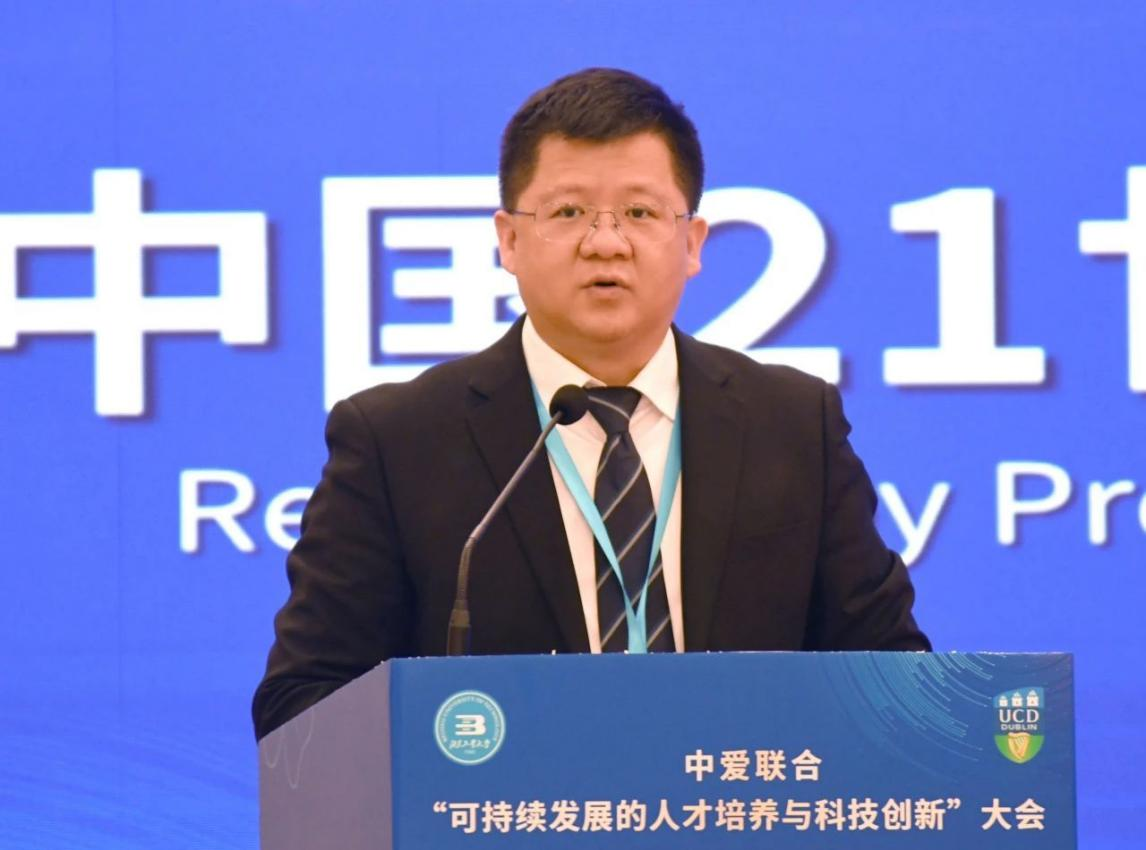
Chen Qizhen noted that China-Ireland friendly exchanges have a long history, with scientific and technological cooperation being a key component. In recent years, the two sides have closely collaborated and achieved fruitful results in areas such as innovative talent cultivation and technological innovation. As a professional institution committed to promoting technological innovation for sustainable development, the Administrative Center for China's Agenda 21 is eager to work with relevant Chinese institutions to deepen cooperation with Ireland in areas such as strategic policy alignment, project collaboration, and academic exchanges. He believed that through in-depth communication and discussions at this symposium, both sides will further consolidate consensus, clarify the direction of cooperation, and jointly contribute to China-Ireland science and technology cooperation and talent development.
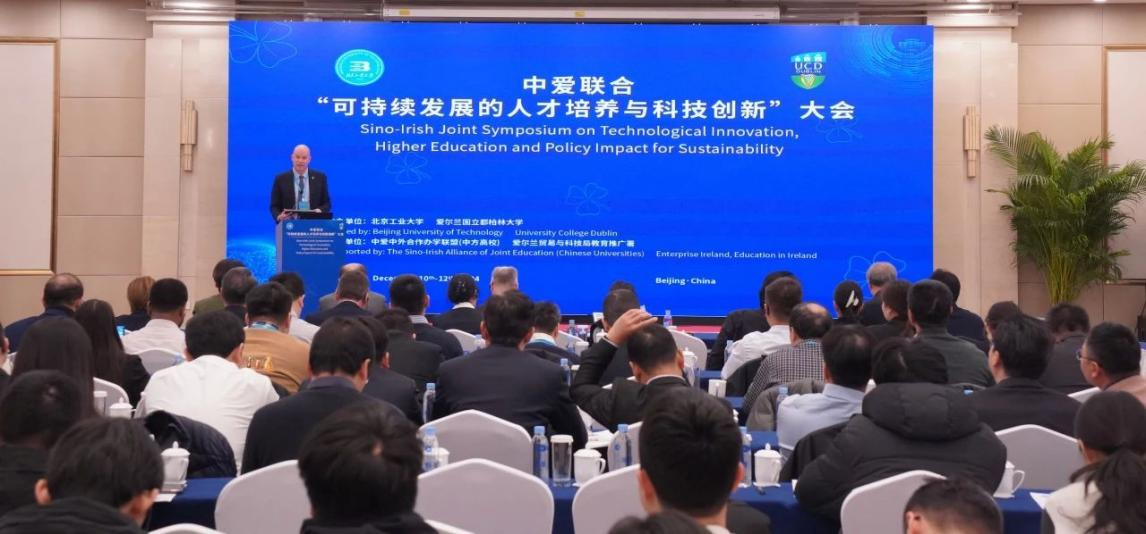

The symposium's report session was chaired by Tatsman Crowe. Zhao Qinping delivered a keynote address titled "Innovating Virtual Reality to Support Smart Education." He stated that advances in information technology continue to drive educational transformation and development. Currently, with the rapid development of emerging technologies such as Big Data, artificial intelligence, and virtual reality, education has entered a new stage of intelligent development. At the same time, new educational demands, such as engineering teaching based on digital twins, virtual-real integrated classrooms, and cognitive and psychological assessments, are setting new goals for virtual reality technology and providing new momentum. He added that virtual reality technology must continue to innovate and develop.
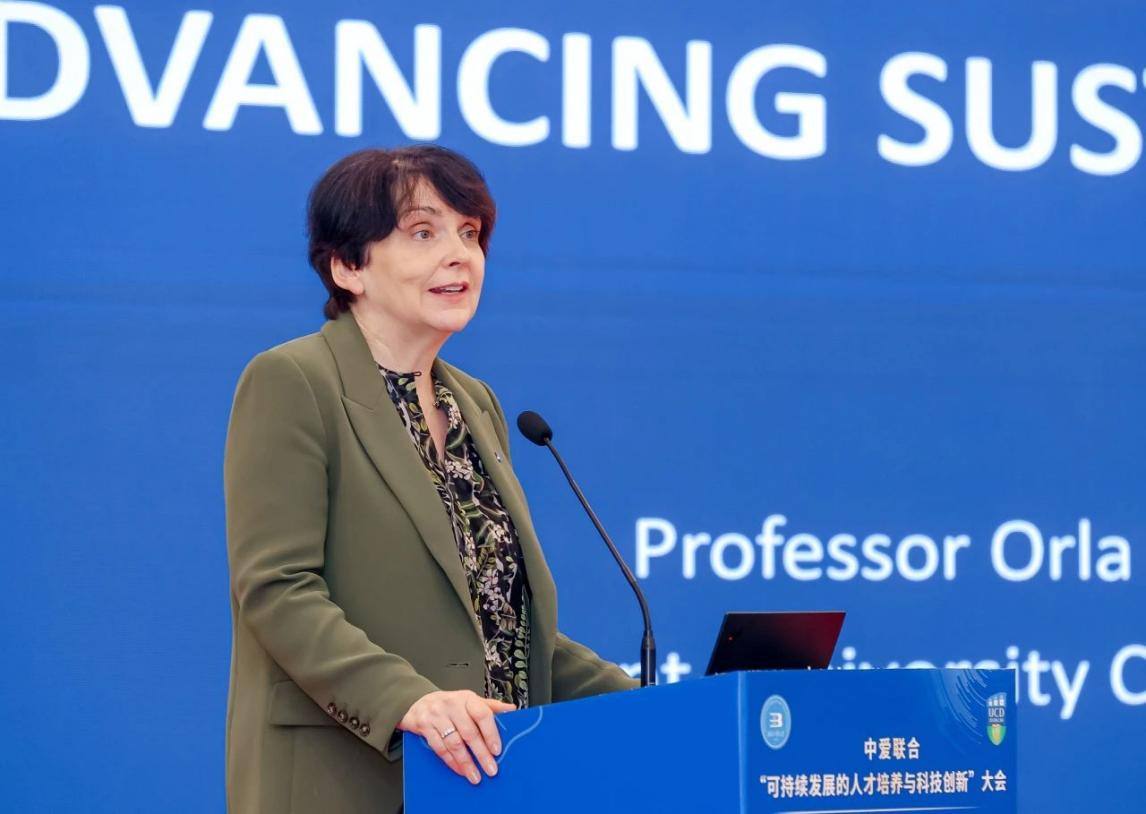
Orla Feely delivered a keynote address on "Technology and Sustainability in Higher Education." She elaborated on UCD's educational philosophy from three perspectives: changing the logic and methods of learning, driving research innovation, and embracing influence. She emphasized that achieving sustainable development requires, on the one hand, the application and promotion of advanced green, low-carbon technologies and, on the other, a strong higher education system, a deep awareness of sustainability, and an exceptional spirit of innovation. UCD continues to promote sustainability by advocating lifelong learning, encouraging research ambition, building physical and digital campuses, integrating resources across campuses, having its roots in the local area while reaching globally, and improving student experience.
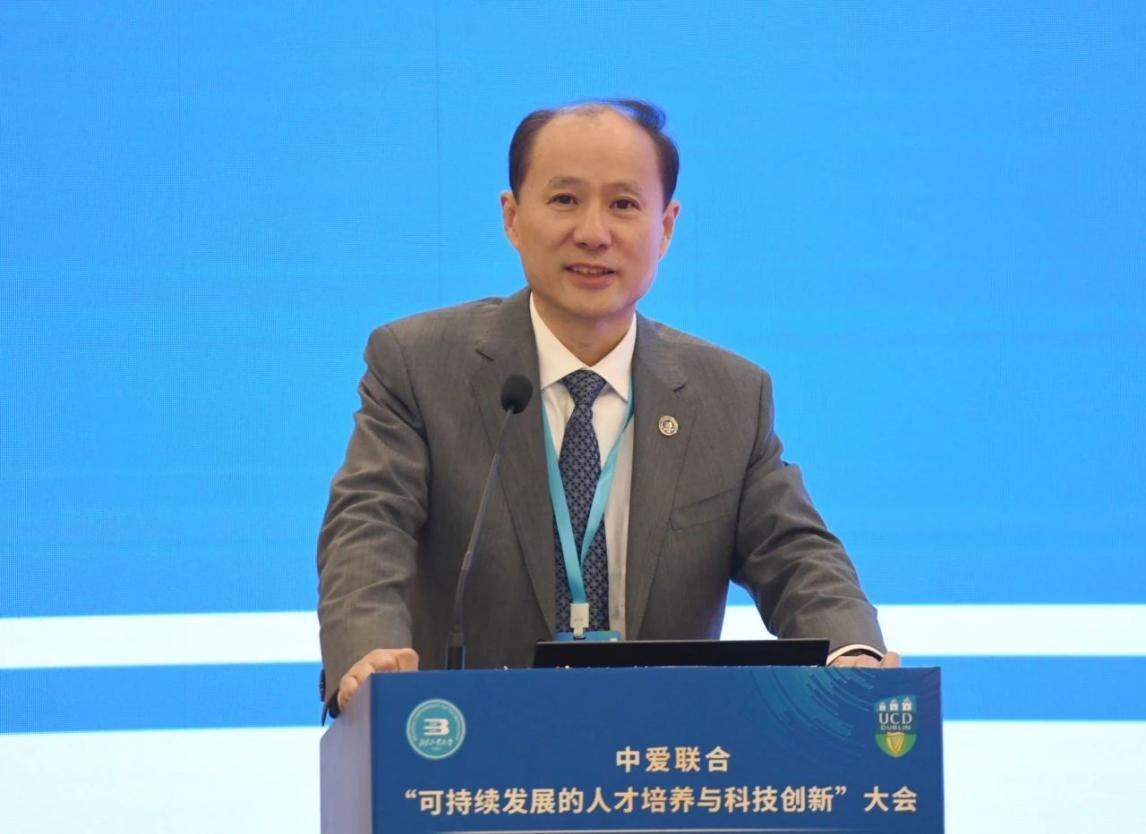
Nie Zuoren presented a keynote speech on "Sustainable Development in University Education, Technological Innovation, and Talent Cultivation." He stated that since the 1990s, BJUT has actively responded to National needs by integrating sustainable development concepts into university education, scientific innovation, and talent cultivation, thereby achieving significant results. BJUThas promoted and contributed to the realization of sustainable development goals through the integrated development of education, technology, and talent. Efforts have included incorporating Xi Jinping Thought on Ecological Civilization into the curriculum, constructing and refining a green, low-carbon academic discipline system, and deepening higher education on sustainable development. In scientific innovation, the University is advancing through multiple initiatives and building high-level industry-academia integration bases. In talent cultivation, it focuses on nurturing new engineering talents for sustainable development, aligning with the "dual-carbon" goals, promoting the dual transformation of, and coordination between,digitalization and Green concepts, and has established the College of Carbon Neutrality Future Technology to independently cultivate top innovative talents for new quality productive forces and sustainable development.
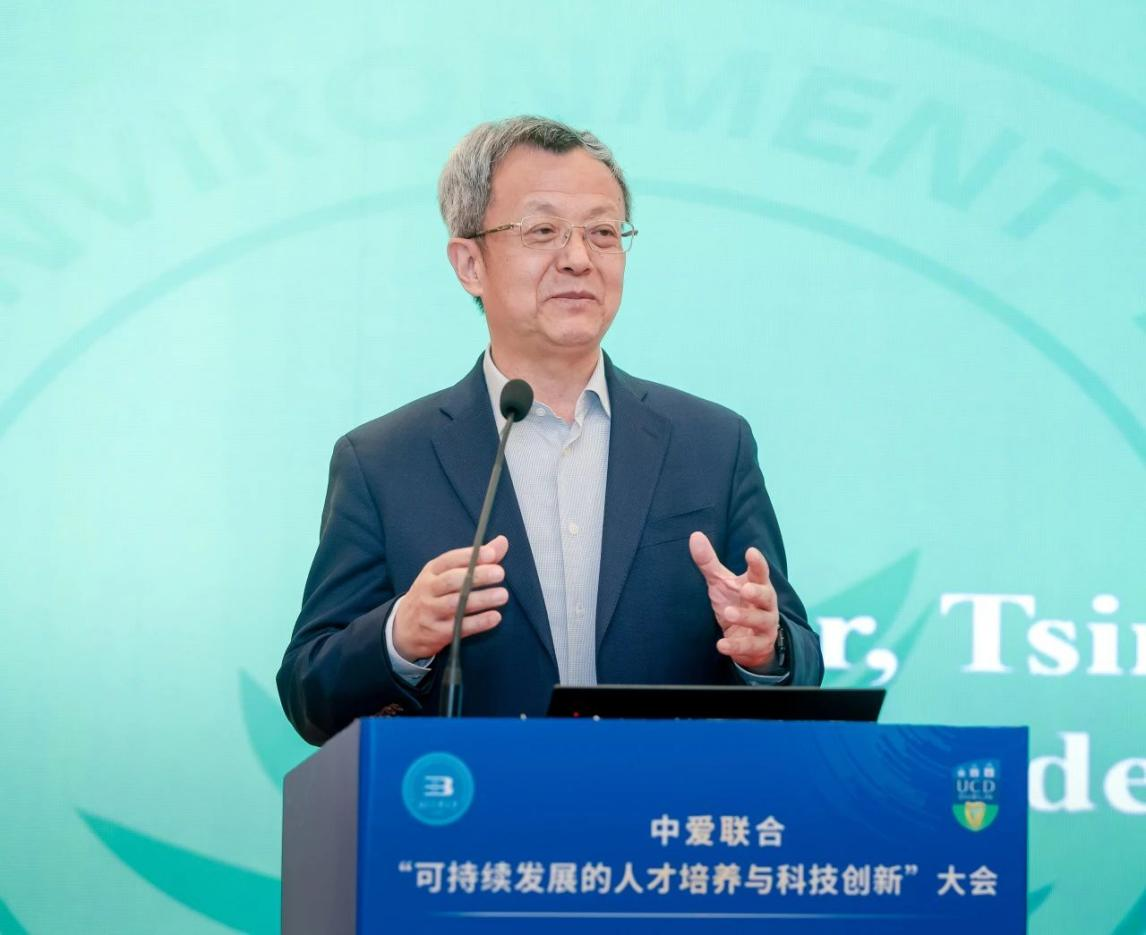
Zhang Xiliang delivered a keynote speech on "Carbon Neutrality and the National Carbon Market Construction," covering three main topics: "Pathways for China's Low-Carbon Energy Economic Transition," "The Practice and Future Directions of China's Carbon Market," and "Sino-Irish University Cooperation on Climate Change." He began by introducing China's carbon neutrality goal and the pathways for the country's low-carbon energy economic transformation, including key low-carbon and zero-carbon technologies and the required investment scale. He then discussed the development of China's carbon neutrality policy system, focusing on the mandatory carbon market, the voluntary carbon market, and the international carbon market. Lastly, he offered suggestions for Sino-Irish university academic exchanges and cooperation, shared his outlook on the prospects for collaboration, and expressed hope that both countries will make greater efforts to contribute to tackling global challenges and achieving sustainable development.
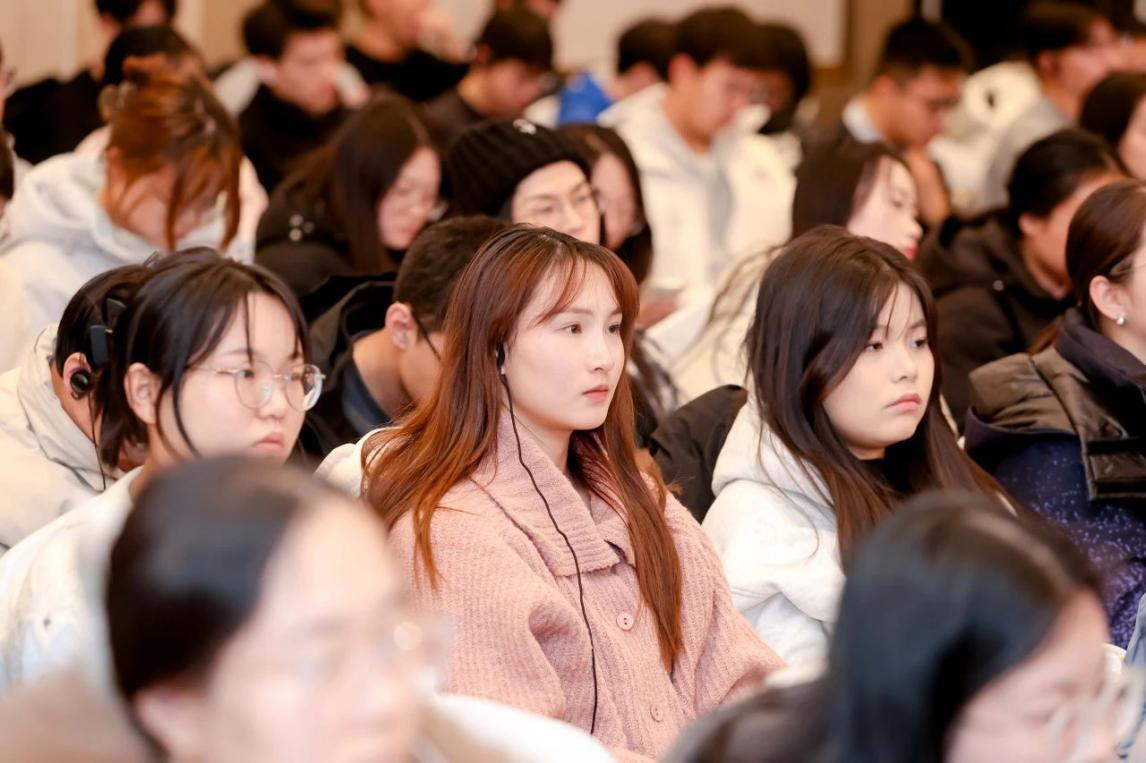
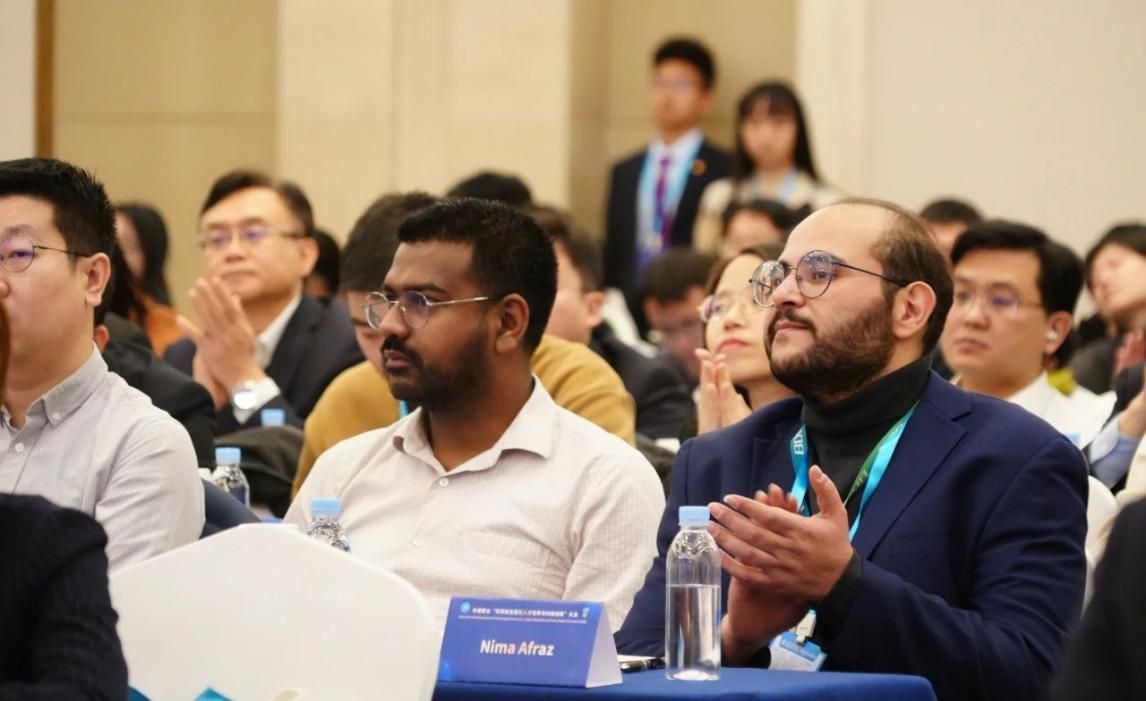
The symposium featured four sub-forums and two roundtable discussions, with 27 academic reports covering topics such as low-carbon actions, environmental protection, urban renewal, digital transformation, Sino-Irish international scientific cooperation policies and opportunities, and the challenges and opportunities of Sino-foreign cooperative education. Experts from various fields presented their academic views, engaged in in-depth discussions, and shared research achievements.
This symposium marked the first visit to BJUT by the Irish Ambassador to China, Nicholas O'Brien, and UCD President Orla Feely. This successful event will further promote deeper academic exchanges and cooperation between the two countries in higher education.
After 12 years of development, the Beijing-Dublin International College at BJUT, a joint educational initiative by BJUT and UCD, has become a model for the high-quality development of Sino-foreign cooperative education. In 2024, the college was ranked among the top 20 exemplary examples of Sino-foreign cooperative educational institutions. Its high-level educational results reflect the new momentum and steady progress in Sino-Irish educational cooperation.




